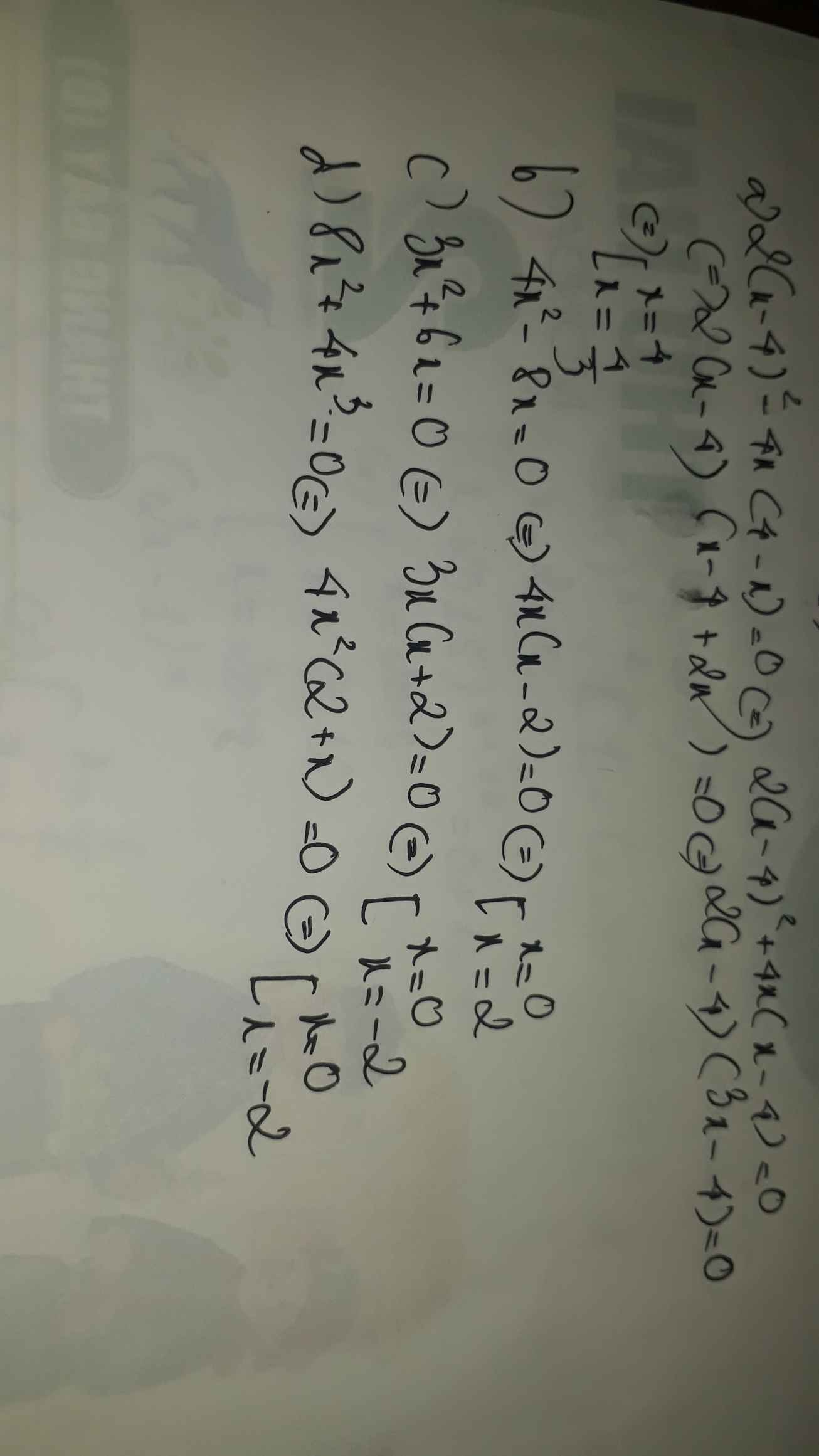Hãy nhập câu hỏi của bạn vào đây, nếu là tài khoản VIP, bạn sẽ được ưu tiên trả lời.


e: ta có: \(4x^2+4x-6=2\)
\(\Leftrightarrow4x^2+4x-8=0\)
\(\Leftrightarrow\left(x+2\right)\left(x-1\right)=0\)
\(\Leftrightarrow\left[{}\begin{matrix}x=-2\\x=1\end{matrix}\right.\)
f: Ta có: \(2x^2+7x+3=0\)
\(\Leftrightarrow\left(x+3\right)\left(2x+1\right)=0\)
\(\Leftrightarrow\left[{}\begin{matrix}x=-3\\x=-\dfrac{1}{2}\end{matrix}\right.\)

*vn:vô nghiệm.
a. \(\left(x^2-2\right)\left(x^2+x+1\right)=0\)
\(\Leftrightarrow\left[{}\begin{matrix}x^2-2=0\\x^2+x+1=0\end{matrix}\right.\)
\(\Leftrightarrow\left[{}\begin{matrix}\left(x-\sqrt{2}\right)\left(x+\sqrt{2}\right)=0\\\left(x+\dfrac{1}{2}\right)^2+\dfrac{3}{4}=0\left(vn\right)\end{matrix}\right.\)
\(\Leftrightarrow x=\pm\sqrt{2}\)
-Vậy \(S=\left\{\pm\sqrt{2}\right\}\).
b. \(16x^2-8x+5=0\)
\(\Leftrightarrow16x^2-8x+1+4=0\)
\(\Leftrightarrow\left(4x-1\right)^2+4=0\) (vô lí)
-Vậy S=∅.
c. \(2x^3-x^2-8x+4=0\)
\(\Leftrightarrow x^2\left(2x-1\right)-4\left(2x-1\right)=0\)
\(\Leftrightarrow\left(2x-1\right)\left(x^2-4\right)=0\)
\(\Leftrightarrow\left(2x-1\right)\left(x-2\right)\left(x+2\right)=0\)
\(\Leftrightarrow\left[{}\begin{matrix}x=\dfrac{1}{2}\\x=\pm2\end{matrix}\right.\)
-Vậy \(S=\left\{\dfrac{1}{2};\pm2\right\}\).
d. \(3x^3+6x^2-75x-150=0\)
\(\Leftrightarrow3x^2\left(x+2\right)-75\left(x+2\right)=0\)
\(\Leftrightarrow3\left(x+2\right)\left(x^2-25\right)=0\)
\(\Leftrightarrow3\left(x+2\right)\left(x+5\right)\left(x-5\right)=0\)
\(\Leftrightarrow\left[{}\begin{matrix}x=-2\\x=\pm5\end{matrix}\right.\)
-Vậy \(S=\left\{-2;\pm5\right\}\)

(x-1)(2x^2-8)=0
\(\Leftrightarrow\left(x-1\right)\left(2x^2-8\right)=0\\ \left(2x^3-8x-2x^2+8\right)=0\)
\(\Leftrightarrow2x\left(x-1\right)-8\left(x-1\right)=0\)
\(\Leftrightarrow x=1;x=\dfrac{8}{2}\)
3x^2-8x+5=0
áp dụng công thức bậc 2 ta có:
\(x=\dfrac{-\left(-8\right)\pm\sqrt{\left(-8\right)^2-4.3.5}}{2.3}\)
\(\Rightarrow x=\dfrac{5}{3};x=1\)
(7x-1).2x-7x+1=0
\(\Leftrightarrow\left(7x-1\right)\left(2x-1\right)=0\)
\(\Leftrightarrow x=\dfrac{1}{7};x=\dfrac{1}{2}\)

Bài 1
a) 5x²y - 20xy²
= 5xy(x - 4y)
b) 1 - 8x + 16x² - y²
= (1 - 8x + 16x²) - y²
= (1 - 4x)² - y²
= (1 - 4x - y)(1 - 4x + y)
c) 4x - 4 - x²
= -(x² - 4x + 4)
= -(x - 2)²
d) x³ - 2x² + x - xy²
= x(x² - 2x + 1 - y²)
= x[(x² - 2x+ 1) - y²]
= x[(x - 1)² - y²]
= x(x - 1 - y)(x - 1 + y)
= x(x - y - 1)(x + y - 1)
e) 27 - 3x²
= 3(9 - x²)
= 3(3 - x)(3 + x)
f) 2x² + 4x + 2 - 2y²
= 2(x² + 2x + 1 - y²)
= 2[(x² + 2x + 1) - y²]
= 2[(x + 1)² - y²]
= 2(x + 1 - y)(x + 1 + y)
= 2(x - y + 1)(x + y + 1)
Bài 2:
a: \(x^2\left(x-2023\right)+x-2023=0\)
=>\(\left(x-2023\right)\left(x^2+1\right)=0\)
mà \(x^2+1>=1>0\forall x\)
nên x-2023=0
=>x=2023
b:
ĐKXĐ: x<>0
\(-x\left(x-4\right)+\left(2x^3-4x^2-9x\right):x=0\)
=>\(-x\left(x-4\right)+2x^2-4x-9=0\)
=>\(-x^2+4x+2x^2-4x-9=0\)
=>\(x^2-9=0\)
=>(x-3)(x+3)=0
=>\(\left[{}\begin{matrix}x-3=0\\x+3=0\end{matrix}\right.\Leftrightarrow\left[{}\begin{matrix}x=3\\x=-3\end{matrix}\right.\)
c: \(x^2+2x-3x-6=0\)
=>\(\left(x^2+2x\right)-\left(3x+6\right)=0\)
=>\(x\left(x+2\right)-3\left(x+2\right)=0\)
=>(x+2)(x-3)=0
=>\(\left[{}\begin{matrix}x+2=0\\x-3=0\end{matrix}\right.\Leftrightarrow\left[{}\begin{matrix}x=3\\x=-2\end{matrix}\right.\)
d: 3x(x-10)-2x+20=0
=>\(3x\left(x-10\right)-\left(2x-20\right)=0\)
=>\(3x\left(x-10\right)-2\left(x-10\right)=0\)
=>\(\left(x-10\right)\left(3x-2\right)=0\)
=>\(\left[{}\begin{matrix}x-10=0\\3x-2=0\end{matrix}\right.\Leftrightarrow\left[{}\begin{matrix}x=\dfrac{2}{3}\\x=10\end{matrix}\right.\)
Câu 1:
a: \(5x^2y-20xy^2\)
\(=5xy\cdot x-5xy\cdot4y\)
\(=5xy\left(x-4y\right)\)
b: \(1-8x+16x^2-y^2\)
\(=\left(16x^2-8x+1\right)-y^2\)
\(=\left(4x-1\right)^2-y^2\)
\(=\left(4x-1-y\right)\left(4x-1+y\right)\)
c: \(4x-4-x^2\)
\(=-\left(x^2-4x+4\right)\)
\(=-\left(x-2\right)^2\)
d: \(x^3-2x^2+x-xy^2\)
\(=x\left(x^2-2x+1-y^2\right)\)
\(=x\left[\left(x^2-2x+1\right)-y^2\right]\)
\(=x\left[\left(x-1\right)^2-y^2\right]\)
\(=x\left(x-1-y\right)\left(x-1+y\right)\)
e: \(27-3x^2\)
\(=3\left(9-x^2\right)\)
\(=3\left(3-x\right)\left(3+x\right)\)
f: \(2x^2+4x+2-2y^2\)
\(=2\left(x^2+2x+1-y^2\right)\)
\(=2\left[\left(x^2+2x+1\right)-y^2\right]\)
\(=2\left[\left(x+1\right)^2-y^2\right]\)
\(=2\left(x+1+y\right)\left(x+1-y\right)\)

\(a,\Leftrightarrow\left(x-2\right)\left(3x-1\right)=0\Leftrightarrow\left[{}\begin{matrix}x=2\\x=\dfrac{1}{3}\end{matrix}\right.\\ b,\Leftrightarrow\left(x-2\right)^3=0\Leftrightarrow x-2=0\Leftrightarrow x=2\\ c,\Leftrightarrow\left(4x-3x-3\right)\left(4x+3x+3\right)=0\\ \Leftrightarrow\left(x-3\right)\left(7x+3\right)=0\Leftrightarrow\left[{}\begin{matrix}x=3\\x=-\dfrac{3}{7}\end{matrix}\right.\\ d,\Leftrightarrow x^2\left(x-1\right)-4\left(x-1\right)^2=0\\ \Leftrightarrow\left(x-1\right)\left(x^2-4x+4\right)=0\\ \Leftrightarrow\left(x-1\right)\left(x-2\right)^2=0\Leftrightarrow\left[{}\begin{matrix}x=1\\x=2\end{matrix}\right.\)

2a) pt <=> (x + 6)^2 = 0
<=> x = -6
b) pt <=> (4x - 1)^2 = 0
<=> x = 1/4
c) pt<=> (x + 1)^3 = 0
<=> x = -1
Bài 1:
a: Ta có: \(A=\left(4x+3y\right)^2+\left(4x-3y\right)^2\)
\(=16x^2+24xy+9y^2+16x^2-24xy+9y^2\)
\(=32x^2+18y^2\)
b: Ta có: \(B=\left(x-2\right)^3-\left(x+2\right)^3\)
\(=x^3-6x^2+12x-8-x^3-6x^2-12x-8\)
\(=-12x^2-24\)

Bài 2:
a: Ta có: \(x^2+12x+36=0\)
\(\Leftrightarrow x+6=0\)
hay x=-6
b: Ta có: \(16x^2-8x+1=0\)
\(\Leftrightarrow4x-1=0\)
hay \(x=\dfrac{1}{4}\)
Bài 1:
a: Ta có: \(A=\left(4x+3y\right)^2+\left(4x-3y\right)^2\)
\(=16x^2+24xy+9y^2+16x^2-24xy+9y^2\)
\(=32x^2+18y^2\)
b: Ta có: \(B=\left(x-2\right)^3-\left(x+2\right)^3\)
\(=x^3-6x^2+12x-8-x^3-6x^2-12x-8\)
\(=-12x^2-24\)
c: Ta có: \(C=\left(x+2y\right)^2+2\left(x+2y\right)\left(x-2y\right)+\left(x-2y\right)^2\)
\(=\left(x+2y+x-2y\right)^2\)
\(=4x^2\)

a) \(\left(x+\frac{1}{x}\right)^2+2\left(x+\frac{1}{x}\right)-8=0\)
\(\Leftrightarrow x^2+2x+\frac{1}{x^2}+\frac{2}{x}-6=0\)
\(\Leftrightarrow x^2x^2+2xx^2+\frac{1}{x^2}x^2+\frac{2}{x^2}x^2-6x^2=0.x^2\)
\(\Leftrightarrow x^4+2x^3+1+2x-6x^2=0\)
\(\Rightarrow\orbr{\begin{cases}x=1\\x=\sqrt{3}\end{cases}}\)
b) \(x^3-8x^2-8x+1=0\)
\(\Leftrightarrow\left(x+1\right)\left(x^2-9x+1\right)=0\)
\(\Rightarrow x=-1\)
c) \(x^4-3x^3+4x^2-3x+1=0\)
\(\Leftrightarrow\left(x-1\right)^2\left(x^2-x+1\right)=0\)
\(\Rightarrow\orbr{\begin{cases}x=1\\x=\frac{1}{2}\end{cases}}\)